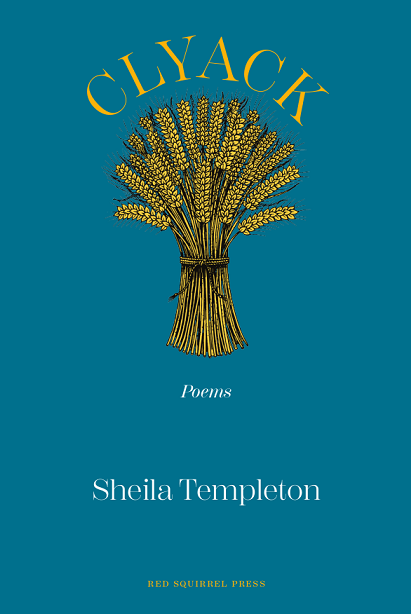Clyack
Sheila Templeton
(Red Squirrel Press, 2021); pbck £10.00
There is a warmth that emanates from the pages of Sheila Templeton’s eclectic collection of remembering, intimate reminiscences that span a lifetime, taking in a whole generation of perspectives. Clyack is a passage through life that can be enjoyed from cover to cover or, like the recollections explored and shared, as memories that surface in the mind, singular and unexpected though inextricably linked.
An epigraph from Luis Grassic Gibbon’s Sunset Song sets a wistful tone, which leads us into the inaugural poem ‘The Clyack Shafe’, winner of the McCash Scots Language Poetry Competition in which an expatriate returns ‘Hame for his eeswaal sax month leave’. Yet this is more than a sabbatical, it is a home-coming; we feel the emptiness of materialism in ‘the bonnie hoose/reamin wi space’, that is ‘waarlds awa fae far he’d startet’. Doric can be a challenge on the page, even for those who are familiar with the lexicon, but do not be discouraged, read aloud the ear clarifies what the eye cannot, as we hear:
the reeshle o skinklin corn
and laugh at the deftly balanced sentiment with humour:
an stooks o hey lik roon breists
to the final stanza, that sense of arriving home, to the land, but ultimately, to the self:
winnin tae the hinner-en, a hairst
weel-gaithert, the clyack-shafe
seer again, in his saal, his ain grun.
Consider ‘Gaps’ a shared memory between brother and sister in the form of ‘A creased photograph, black and white’. Templeton’s descriptive prowess captures a humorous image of the speaker with clarity:
I’m scowling through tangled hair
my knees soft-buckled, boneless
the way children stand
holding my little brother’s hand[.]
Memories hook memories but the focus here is not that which is remembered, but the disparity of that memory between witnesses: ‘He’s oblivious to the scolding we’ve had,/ […] I asked him 70 years on, what he remembers’. The pivotal point is the fifth stanza, a single line and a thought-provoking observation: ‘The gap between being two and being four.’ Here, the aperture widens to contextualise the gap in its quiet enormity:
And Mammy weeping
crouched on the cold slate doorstep
The assonance slows the cadence in a pained howl:
as blue-white milk pooled under her knees[.]
And the naivety of the young girl with the urge to ‘mop this puddle of despair/–my party piece for visitors. Much admired’, as she recites perfectly the names of the Munros, oblivious to ‘the daylight swallowed by the grab of the dark[.]’
Despite the impressive travel of this collection, what has surprised me is the travel within each poem. Take ‘Efterhin’ a tender narrative, the speaker recounting a conversation with a widow at a wedding discussing what ‘[…] dis bring a tear that aftentimes spills ower’. We can be forgiven for assuming this particular piece is humorous as we take in the line:
[…]Nae eyven
the voos an the tremmlin fummle o rings.
and
it’s nae even the speeches, or the luik they gie eenanither
fan he swallies, an stummles ower Oan behalf o my wife an mysel…
We sit forward in our seats, smiling, laughing, perhaps:
Fit braks ma hert is fan the dancing sterts.
Did I iver tell ye he cudna daunce, fan we first went thegither?
So I fun anither lad, for a fyle. And then he askit me oot again[.]
And in a single line, Templeton delivers a lifetime:
He’d been tae classes, learned tae dance[.]
This review does not reflect the ‘travel’ of this collection in terms of the number of poems I have paid homage to, and this is down to Templeton’s skill at gaitherin the range of emotional turbulence and joy of a generation, tightly bound in a hairst o clyack sheaf. Finally, in ‘Seellence’, we experience ‘the calloused roch o Granda’s waarm grip’ to the final line, and lesson, in the collection that we all learn sooner or later about life:
has tae be hard-lairnt, lik aathing else.
Wanda McGregor


Leave a Reply